About soldiers and internal martial artists
The martial artist is an artist.
He is not an expert or a sporter.
"The artist is not a person endowed with free will who seeks his own ends,
but allows art to realize its purposes through him.
As a human being he may have moods and a will and personal aims,
but as an artist he is "man" in a higher sense.
He is a 'collective man',
a vehicle and moulder of the unconscious psychic life of mankind".
(Carl Gustav Jung - Psychology and Literature)
Tai Chi Chuan must be a matter of principles, it cannot be a matter of rules.
The moment it degenerates into rules, it ceases to be Tai Chi Chuan as it kills responsability.
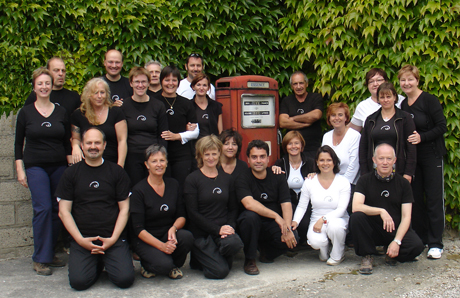
Rules are made for soldiers.
The essence of Tai Chi is responsability, spontaneity, creativity and exploration.
Man should live in a way his happiness depends as little as possible on external things.
That's the way of the real warrior.
Free exploration is essential.
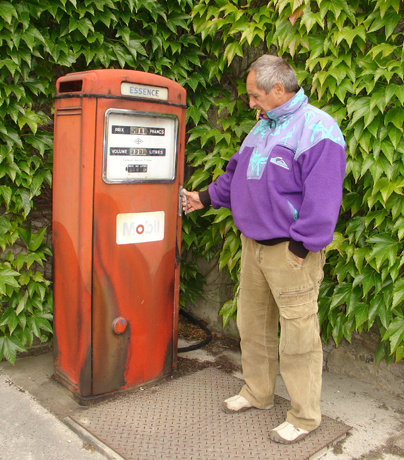
Man is the only animal who must create a dialogue with nature in order
to experience the essence of his own being.
The essence of his being is the feeling of an absolute dependance.
The first step to freedom is dependence.
Every human being is fully dependent on nature for their next breath,
for their next mail.
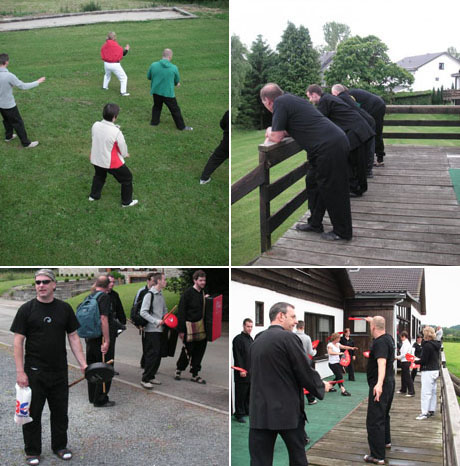
Where the spirit is, there is joy and freedom to move and to join.
It is the fear that paralizes one.
The other side of fear is freedom. Real warriors are freedom fighters.
In our school there is no democracy. There is freedom.
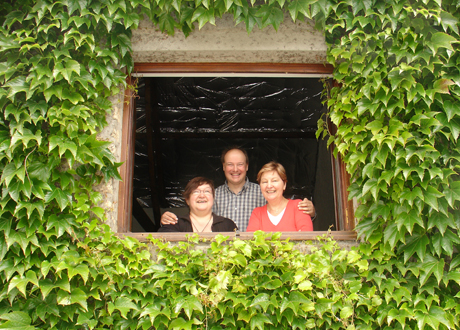
We have to have a vision, we can't blow an uncertain trumpet.
In essence it's about love in a drug- and twitter culture.
Love can set us free. Freedom is not the same as democracy. We are gouverned by sensors and ruled by economic circumstances,
our lives are dictated by machinations of capital. We are guided by the media, by non-human entities. Our levels of
happiness are not rising, and may even be declining in a culture obsessed by personal feelings and meanings. Tai Chi Chuan
must be a matter of principles. Behind the world of Tai Chi forms there is a timeless level, there is Tai Chi existing in
the universe. Therefore Tai Chi Chuan transmits the principles lo live with our nature and with the nature of Universe.
The Way of the Warrior leads to the world of essence.
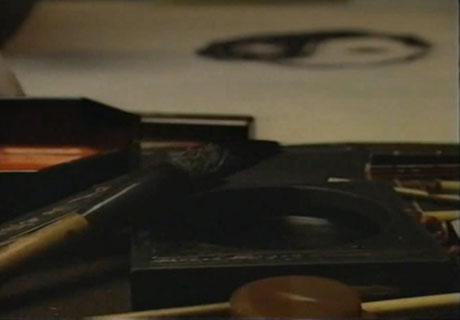
Behind the world of forms there is a timeless level.
There is the world of essence.
The Real Warrior stops his internal dialogue.
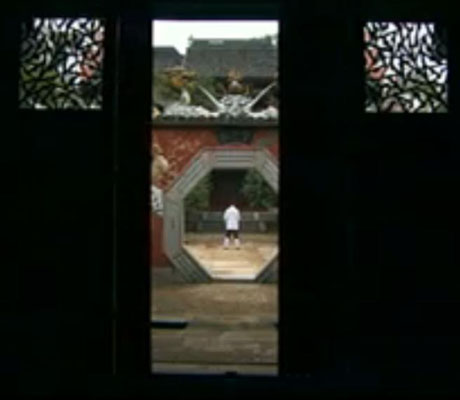
The deeper dialogue with the essence
opens up after the Warrior has learned to shut off his internal dialogue.
*Internal dialogue has to do with ego.
A form is a form.
A Tai Chi form is only a birthplace of thoughts, emotions, ideas.
It's a birthplace of essence.
Behind the world of Tai Chi forms there is a timeless level.
There is the level of the essence.
Yang Cheng Fu
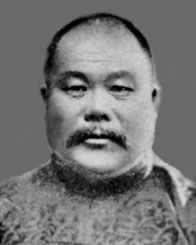
Sometimes Tai Chi Chuan can be a great martial art,
if applied right.
Tai Chi is a martial art. While self defense may seem like a simple thing the truth isn't
that simple. Shifting mental gears isn't something you just do. So effective self-defense
training requires a realistic assessment and evaluation of your emotional potential. This
is the concept: where mind goes, energy flows. What we give our attention to, we give our
energy to. If your mind is not 100% behind your action, you are cutting away up to 80% of
your potential. Keep in mind it is not God's job to control nor your mind, nor your emotional potential.
"Finally, sisters and brothers, whatever is true, whatever is noble, whatever is right,
whatever is pure, whatever is lovely, whatever is admirable– if anything is excellent or
praiseworthy– think about such things".
Practicing Tai Chi as a combat art It's more difficult to apply than a hard style like MMA,
Krav Maga, karate, jitsu or whatever. Violence has different levels and purposes, but the
problem in self defense is that you have to make split-second decisions. Practicing combat
Tai Chi or "split-second fighting" goes against most people's instincts. Fight you own instinct,
your instinct is wrong. Use 'the wisdom' of your reptilian brain, Imagine I am throwing a flurry
of jabs at you. In my mind, I "know" exactly what you are going to do: backpedal to escape my
jab-attacks. The Tai Chi Classics say: attack first! How surprised am I going to be when you
step forward, along your trusty Tai Chi triangle (the Tai Chi V method), and not backward? I would
be very surprised because you are not "supposed" to step into a savage attack. You are "supposed"
to step away from it.
For many reasons it's pretty difficult to find a Tai Chi instructor who can competently teach the
healing (Qigong aspects), the martial aspects of Tai Chi (weigong) along with the spiritual aspects
(neigong aspects) as well. In the West most popular Tai Chi instructors don't have any martial arts
nor combat experience, what they practice has nothing to do with Tai Chi nor with internal martial
arts. Times were when, I started my martial training in 1969, 1970... the traditional hard stuff,
and today I know 2 or 3 things for sure about internal martial arts. However I know enough about
the combat side of Tai Chi to recommend it to anyone seeking a softer martial art, or a great -to
me the greatest, the most complete and perhaps the most deadly- exercise system with self-defense
applications.
The Yang Cheng Fu style is the most widely known style of Taiji in the world. As most Tai Chi
practitioners know, Yang Cheng Fu Tai Chi does not practice Fa-Jing, so all those slow, smooth
movements are complete useless without penetrating, explosive Fa Jing strikes. The Yang Cheng Fu
style is the most widely known style of Taiji in the world, that's all OK, if you like it why not
but it's not the real stuff. The real stuff is the supreme ultimate, great for health, body and soul,
but this real stuff is not sugar for the soul. The legendary fighter Yang Lu Chan, learned the real
stuff from Chen Chang Zhing in Chen village. His grandson, Yang Cheng Fu, reevaluated the art and
developed it into a distinctly different style, replacing the changing tempos and rising and falling
postures with a sedate but not sufficient set of gentle movements and postures. Elderly or sick people
should take up this gentle (martial) art of Tai Chi for the sake of their physical and mental health.
Yang Lu Chan
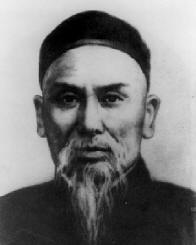
The real Yang Tai Chi stuff.
Sensitivity is the basis of your martial skills because all of them requires people to know their
opponent's reaction. This is the most common error in push-hands practice; push-hands practice develops
skills that are useful in combat for sure, but this practice is only the first step, a way to use your
martial skills. When it comes to the street or battleground it is near useless for actual combat against
folks who are really trying to kill you and not just score points or push you. Erle Montaigue: "What
they miss is what this simple movement is doing internally. Many would look, and pick up the movement
easily. But they will not have it. Because they aren't seeing the hands. The hands are the most important
area of the body as far as Yang Lu Chan's Taijiquan is concerned. When watching someone practice their
Yang Lu Chan's form, an advanced practitioner will never look at beautiful low stances or perfect body
alignment. The hands are what to look for as it is the hands that show the internal."
Self defense is a multi-person melee and free for all, there is no such thing as a "real" fight or "real"
self defense. There is only self defense that may safe your life and the object is to kill or incapacitate
the enemy, then turn round and do it again. Then turn round and do it once more, and that's it. Yang Lu
Chan was considered a great fighter. He didn't "use the form" on them. The idea of "using the form" on
someone means you are instantly inviting defeat. Non-Acting, not interfering, nor acting against one's
naturalness by following the Wu-Wei principle, one's actions conform to the principles of the cosmos, and
that's real Tai Chi Chuan. The form is just a necessary condition, it's a set of movements that should be
used as a method of training basic principles of practice, a catalogue of example fighting techniques. The
ultimate goal of Tai Chi Chuan is formlessness, not doing, doing by doing nothing. Finally everything you
do should become spiritual-martial through being powered by the correct Tai Chi principles.
"Dear Erle,
Thank you for video. It's really great. But, can you tell me why no one does Taiji like you, I mean opening
and closing and things like separation of yin and yang etc. Why it seams that so called great masters do
things like double weighting. Thank you."
"Dear Robert,
It all began at the beginning of this century (20th) when all of the great masters had a meeting! At that meeting
they decided that too many people were getting the good oil on their family systems. So they all (bar one)
agreed to change the forms and only teach the very basic forms. Trouble was that people found these forms
quite easy and as humans are, left their teachers before they were ready and taught the very basics thinking
that this was all there was!
Hence nowadays I only know a couple of modern masters who are doing it correctly! Most break some or all of
the rules of the classics! The one who did not change his forms was Yang Shou-hou who, for this reason only
ever took on 3 students, one of whom (thankfully) was my main teacher, Chang Yiu-chun.
The closest you can get to the original Yang from anyone else is from Mr Chang in Louisiana who is now 82 and
who is a student of Chen Pan-ling who was one of the three also. However, Chen changed the system slightly
and called it his 'synthesized version' where he mixed some Wu style in with it. It is well documented in a
new book and wall chart published by Chang in the USA and is quite close to the Original Yang
Kind Regards
Erle Montaigue"
Chang Yiu-chun, The Last Interview
By Erle Montaigue
In my final term with Chang I became adept at phrasing questions so that I would not end up in great pain and I
would ask questions that I needed to know the answers to as I guess I sensed that he would not be around for much
longer. I told him that the way that he did his Taiji form was still greatly different to what I was doing, even
though I thought that I was doing it at the highest level. His answer was like a hammer to my head and something
that I still remember with vivid detail.
"You are doing Taiji, I am not".
I was a little worried about this statement. Before I could question him further he answered me.
"Go around to all of the Taiji classes. And then come back to me. If you still wish to do Taiji, then go and learn from them."
By this stage, I was more than a little confused but Chang would not be budged on this, no more questions.
I did what he wanted me to, even though I knew what the others were teaching and something fell on me. Even though
they were doing different styles, Chen, Yang, Wu etc. They were all still "doing" Taiji. It seemed like an effort,
like it was something different that they had to do each day. Whereas when Chang did it, it was as if he was not
doing anything, he would talk to me while he was doing his form, he would look around, take in the local scenery,
but he was always so still and at peace with everything. He would never actually finish the form, but rather just
move into another area of form, like walking to his place of residence, or having a cup of tea.
My next visit to Chang, was different. I told him that he was not doing Taiji but rather living Taiji. He answered
again in the negative. "No, you are still wrong, I am not living anything, I am Taiji". He went on, "You are trying
to do Taiji, so you will never realise the fighting of Taiji nor the healing of Taiji. You are much stronger than me,
and faster, but I seem faster and stronger than you. I am not. I am Taiji."
From then onward, I tried to be Taiji with every waking and sleeping moment being as if I were still doing the form.
That was his greatest gift to me. To show me to not do Taiji.
Later and just before he left, Chang told me about the more physical reasons as to why he was not doing Taiji. He even
said that he would probably not even call his Taiji, "Taiji" but rather take it back to its original name of "Hao Ch'uan"
which means loose boxing. This, too came as a big shock as I thought that the name "T'ai Chi Ch'uan" had been with us
from the start, but it has not. In fact, if Yang Lu ch'an came back to us now, he would probably want to learn this
great new art that had the temerity to take on the name of "The Supreme Ultimate Boxing". That name has only been with us,
Chang tells me, and as I have also read in other writings since then, since the late 1800's. Before that it was called
Loose boxing. Chang would say, "look at them", on many of the occasions when we would stay concealed and watch a Taiji
class, "does that look like loose!" They are slow and very relaxed, but it is not loose, they move like a box!" And it
was true, they were moving like boxes. And that was the most poignant thing that anyone has ever said about anyone else's
Taiji, they move like boxes.
We spend many hours trying to get our bones all moving together, but when Chang did it, it was as if his bones were not
connected, but rather, one tiny movement down here would set something in motion up here, and one tiny movement up here
would set the whole body into motion, not altogether, but rather a millisecond after that initial movement. And isn't that
the way was used fa-jing?" This was the physical difference between my own "Hao Ch'uan" and his. There were so many little
shaking movements, so small that one would only know that there was something different. Only once did Chang do the form
so that I could see all of the shakes and that was enough. That was my last lesson with him. Upon which he said, and I
will use his exact words here, "No need me". He was never at our training spot again.
His muscles were gone, he could not make use of the ground any more as for this one needs to have physical strength but
he was strong and I often wonder whether it was just that I was at a low level of training at that time, but I don't think
so, I was strong then, much stronger and younger than I am now, and yet I could not match him, and yes, I did try. I was
never one for "playing the game" of pleasing the master, which got me into much trouble in my earlier years with other masters.
I know that Chang went back to China and would like to think that he is still alive on some mountain top. But if he were
here, I can hear him saying in Chinese, something like the equivalent of "Bullshit!" That's the way he was, an F.C. in the
true sense of the word.
For those of you wondering what F.C. means. It's a secret society of martial artists, and others who have passed the true
test of life.
Erle Montaigue
http://www.taijiworld.com/
Real martial artists have passed the true test of life.
The level of the forms is the level of "the 10000 things".
Forms are fixed.
Everything is flux.
Tai Chi forms are a physical dialogue between
the world of forms and the world of essence.
The world of essence is the real world.
Two monologues do not make a dialogue.
How can there be a dialogue if one partner is dumb ?
How can there be a dialogue if one partner is blind ?
Everything is always changing.
People don't resist changes, they resist being changed.
In true dialogue both partners are willing to be changed.
To fight is to perpetuate conflict between egos.
The Warrior stops the internal monologue with his own ego
The deeper dialogue opens up
after the warrior has learned to shut off his internal monologue.
And... Change has come.
Some people say:
"Martial Tai Chi is intended for the sole purpose of developing fighting skills to defend ourselves and protect others from harm".
I am afraid to offer opinions of my own, but that’s not my first or even my second opinion.
Life can be a struggle
but
some people fight against their own life.
To fight is to perpetuate conflict.
A real martial artist is a soldier of life.
A good soldier of love
who has to be prepared to not relinquish control of his own life.
A good soldier is not violent
A good fighter is not angry
A good winner is not vengeful.
(Tao Te Tsjing)
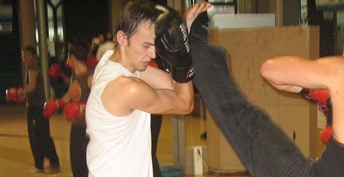
The essential difference between a soldier and an internal martial artist?
A soldier interprets new situations in terms of win or lose.
This appears simple, but in fact it is overly simplistic.
Internal martial artists, on the other hand, see new situations as a game.
Each new situation presents opportunities to gain new experiences.
Win and lose are subordinate to personal growth.
This is not simplistic - it is simple.
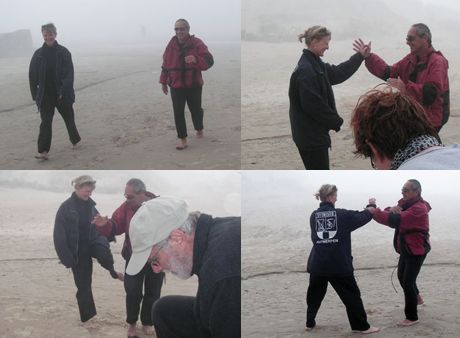
To see new situations as a game.
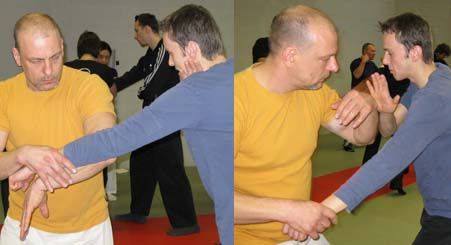
Win and lose are subordinate to personal growth.
Tai Chi Chuan should be a physical/mental tool
falls in line with your own spiritual fitness plan.
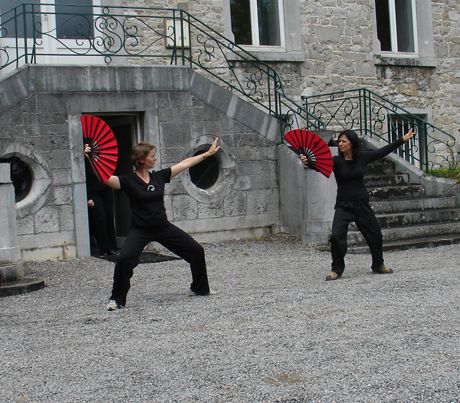
(Photo:Tai Chi Fan- shadow fighting)
Being a loser is not so easy.
The problem is that you are not the winner
But a good loser is always a winner.
The winner does not take it all.
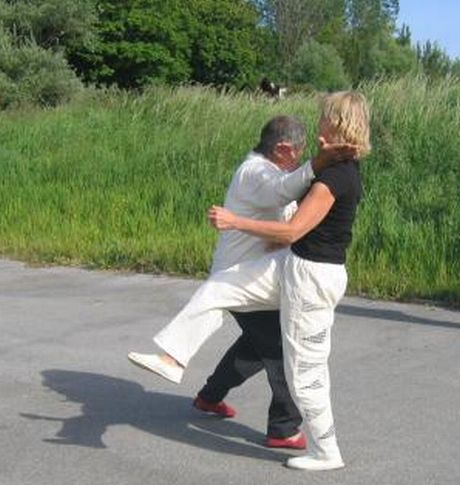
If you want to be happy, then be it. (Chinese proverb)
Well then: if you want to 'master' a martial application, then 'master' it.
If you want it to succeed, then let it succeed.
If you want to do it, then do it.
If necessary, pretend to master the application,
as if you've been doing it for years.
There's a good chance that it will succeed.
The difference between success and failure is often in your head.
This does bring risks of overestimating your capabilities.
But:
Those who are not prepared to take this risk will risk never succeeding in a single application.
Self-defence always entails a risk:
You have to be prepared to not relinquish control of your own destiny.
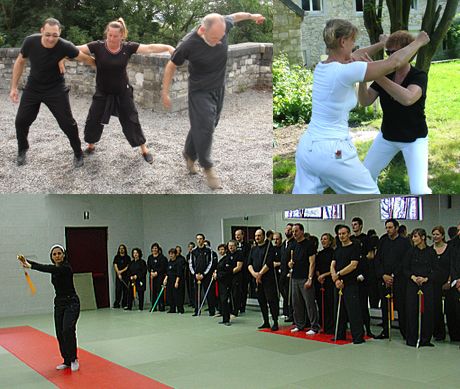
Self defence always entails a risk:
You have to be prepared to not relinquish control of your own destiny.
A Taoistic advise:
Watch your thoughts for they become words
Watch your words for they become actions
Watch your actions for they become habits
Watch your habits for they become character
Watch your character for it becomes your destiny.

You have to be prepared to not relinquish control of your own destiny.
If you don’t control your mind, someone else will.
 Chinese Classics about virtue.
Chinese Classics about virtue.